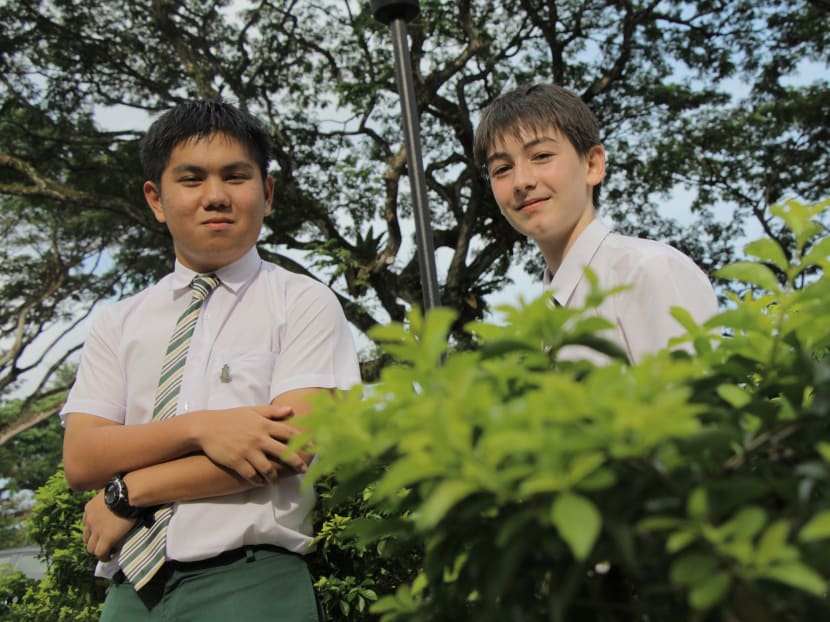‘Science isn’t boring or lonely’
SINGAPORE — Scientific research is far from a solitary endeavour. “What people assume about working on science and research — that it’s boring and lonely — just isn’t true,” said Benjamin Chan, a student at Saint Joseph’s Institution International. “Through the course of our research, we gained new friends in our school science department.”

Benjamin Chan (left) and Paul Jeanbert of SJI Internationl work on harnessing solar energy through plants. Photo: Sion Touhig
SINGAPORE — Scientific research is far from a solitary endeavour. “What people assume about working on science and research — that it’s boring and lonely — just isn’t true,” said Benjamin Chan, a student at Saint Joseph’s Institution International. “Through the course of our research, we gained new friends in our school science department.”
Benjamin and Paul Jeanbert, also a student at SJI International, made up the team that clinched one of only 90 regional-finalist spots in the world in last year’s Google Science Fair, an annual online science competition for youths aged 13 to 18.
Benjamin and Paul’s project aimed to use the environment — in their case, the light-trapping pigment chlorophyll in plants — for a different purpose. “We asked, ‘Why can’t we generate the same energy from solar power to sustain plant life on Earth?’ Since this has worked for many millions of years, why can’t we use this for our own purposes?” said Benjamin.
On the duo’s motivation for taking part in the Google Science Fair, Paul said: “We both like science. Benjamin is interested in energy and how to harness energy from various sources. The main bug for me was that I didn’t know how chloroplasts (the organelles in plant cells that contain chlorophyll) function, so we decided to work together and create a (biological) solar panel.”
The team devised a method of intercepting the electron cascade process — the light-initiated transfer of energy between chlorophyll molecules — that takes place in chloroplasts to obtain a viable electrical current from them. And to create solar panels that are affordable and efficient, Paul chanced upon the idea of using polypyrrole, a transparent polymer that conducts electricity.
Said Benjamin: “Currently, we have solar technology, but it’s expensive, inefficient and fragile — if silicon-based solar panels shatter, they can’t be used anymore — and they have a certain lifespan. The implication of our project is a highly efficient solar cell, so we hope that this may become a method that lasts longer than silicon photovoltaics.” The team also intended for their plant-based solar panels to be biodegradable and self-sustaining, with the chloroplasts producing enough glucose, carbon dioxide and oxygen for their own survival.
“What we believe is that although people say we should reduce power usage, our demand for energy will double within the next 20 years. We’re using more power, and there’s no way to cut back; we just have to find ways to work around it,” added Benjamin.
In a research effort that took about 1,000 hours over four months, the team exceeded the requirements of their school curriculum. “Our research took us into university-level knowledge (of biochemistry),” said Paul. “We like to find out what’s not taught in school, instead of accepting whatever we’re given as the ultimate fact.”
Despite the conclusion of Google Science Fair 2012, work is not over for the team. “We’re still continuing the research,” said Benjamin. “Perhaps half of the Google Science Fair participants abandoned their projects once the competition was over, but we want to continue to make our project work — that’s what’s important to us.”
The regional finalists of this year’s Google Science Fair were announced on June 12, and a total of six teams from Singapore made the cut. On his advice to Google Science Fair participants, Benjamin said: “The rewards of your effort will always come through, even if you don’t get selected. The key thing is that you completed your project and submitted it, and you have something you can be proud of.”





